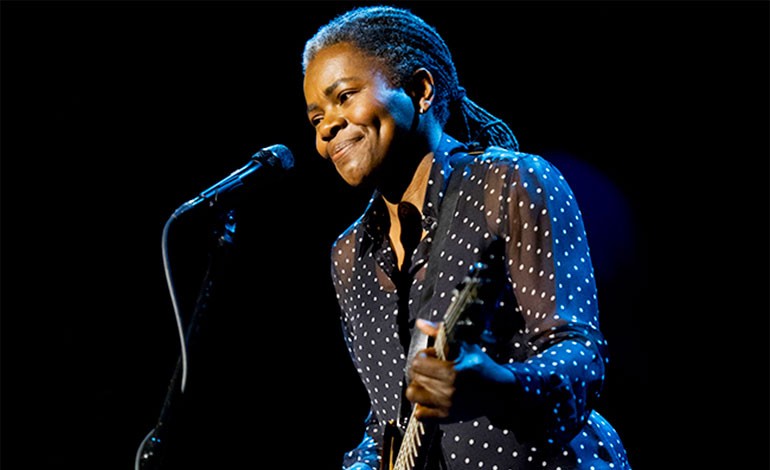By Michael S. Rosenwald, Globe Staff, 11/26/2003
Tracy Chapman began her music career in Harvard Square, both above and below ground, but mostly above, for she quickly discovered that subway station acoustics were not exactly prime for a musician singing and strumming an unplugged guitar.
“I never wanted to play with an amp, and after a while I found that I couldn’t hear myself over a train,” the former Tufts student and Grammy winner said from her home in San Francisco. “The trains come pretty frequently. It’s pretty difficult to project over a train unless you’re an opera singer.”
So it will be difficult, if not impossible, Chapman said, for Boston musicians to continue performing under the new MBTA rules now scheduled for implementation on Dec. 8, rules banning the use of amplifiers and microphones, as well as the playing of any electric instrument or horn.
And that, Chapman said, would be a shame.
“It adds to the quality of urban life to have music in public spaces,” she said. “And it’s something Boston is known for. It’s part of the city, part of what it’s about. People come up to me all over the country and tell me they remember seeing me in Harvard Square.”
The music, said Chapman and other former buskers, is the closest thing to pure performance a musician will ever encounter, transforming dusty, gritty, and hectic environments into places where time slows down and people are moved to tap their feet.
And when it gets cold, she and other musicians say, subways become “the winter streets,” the only public free space where it’s comfortable for people to stop and listen.
“I think what I like about it is that in a way, making music in a public space — it’s sort of an experience that epitomizes a democratic free society,” Chapman said. “What are the requirements? There really are none. It’s about having the nerve to put yourself out there and take a chance, to see if you can do it, to see if people would be willing to stop what they’re doing, look up at you, and listen. That’s music.”
Plenty of other musicians — Mary Lou Lord, Shawn Colvin, G Love and Special Sauce, to name a few — have performed in MBTA stations. Peter Mulvey, a Milwaukee songwriter and guitar player and former subway busker, recorded an entire album in the underground Davis Square T station as a sort of ode to playing music for some coins and, if he was good enough, some paper money. “I managed to make a whole record down there without bothering anyone,” Mulvey said. “This whole thing seems really insane and schoolmarmish.”
He bristled at the MBTA’s statement that part of the reason for the ban was so that riders could hear public address announcements.
“They are inaudible anyway,” he said. “After a while of being down there so long, I could figure out what they were saying, and I was a sort of translator for people down there. `The next train is an Ashmont train. This is an express train.’ It was pretty funny.”
For beginning musicians, the importance of playing in the subway and other public places goes beyond nostalgic reminiscence, Chapman and Mulvey said. It’s also about money. Chapman initially performed to make enough money for Chinese takeout food. But for more regular performers, four or five hours of work a few days a week can generate enough money to pay basic bills.
And there is something deeply instructive about playing in a subway: The audience has to be won over; they haven’t paid to hear a concert.
“There’s a lot of people who are walking by or reading a paper or something and you have to figure out how to keep them there,” Chapman said. “It was the most challenging performance experience that I have ever had.”
Former governor Michael S. Dukakis — perhaps the state’s most famous subway rider and the former first seat trumpet player of Brookline High School, Class of 1951 — worries that the new rules will erode something that’s special about the city.
“I love the music down there,” Dukakis said. “The subway musicians make Boston a better place.”
Dukakis, who was governor in the 1970s and 1980s, started “Music Under Boston” during his first administration. Boston Symphony Orchestra members and other local musicians played in downtown subway stations as part of the program.
“It humanizes the subways, and that’s what I wanted,” Dukakis said. “It’s good for the performers and good for the patrons. It just makes the place much more user friendly and fun.”
© Copyright 2003 Globe Newspaper Company.


